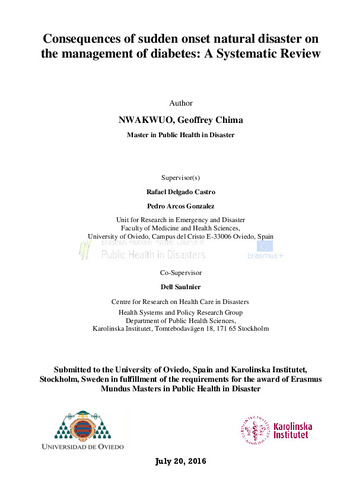Consequences of sudden onset natural disaster on the management of diabetes: A Systematic Review
Otros títulos:
Consecuencias del desastre natural de inicio repentino en el manejo de la diabetes: una revisión sistemática
Autor(es) y otros:
Director(es):
Palabra(s) clave:
Sudden onset
Natural disaster
Exacerbation
Diabetes
Management
Glycaemic control
Fecha de publicación:
Serie:
Máster Erasmus Mundus en Salud Pública y Desastres=Erasmus Mundus Master Course in Public Health in Disasters
Resumen:
Aim: To assess the impact of sudden onset natural disasters on the management of diabetes by identifying the consequences at both individual and institutional level. Settings: The study did not consider sudden onset natural disasters and its consequences on diabetes management in a particular setting like geographical location due paucity of research in this area. Therefore, all studies despite the setting surrounding the topic were assessed. Method: This study is a review and included the application of the integrative review methodology. The PRISMA 2009 checklist was used to guide the presentation of the study. The search was done on PubMed, Web of Science, CINAHL, and Science direct using a pretested search terms. Principles of qualitative research were employed for the evaluation and information were categorization into consequences on individuals and the institutional. Results: The review identified and included 31 eligible articles. The majority of the disaster are Earthquake (55%) and Hurricane (32%), and most of the articles were from developed countries. The review showed destructions of medical facilities and pharmaceuticals causes’ interruption of medical services and supplies, and loss/destruction of records. Evacuation, inadequate diets, and post-traumatic stress was associated with worsening of glycaemic control. Increases incidence was reported and exacerbation of diabetic condition, possess a risk of complication and death. Conclusion: Traditional disaster preparedness plans in past decades did not include the management of diabetes in disaster and despite new frameworks developed, identification and understanding of the impacts, is needed for integrated implementation of the guidelines.
Aim: To assess the impact of sudden onset natural disasters on the management of diabetes by identifying the consequences at both individual and institutional level. Settings: The study did not consider sudden onset natural disasters and its consequences on diabetes management in a particular setting like geographical location due paucity of research in this area. Therefore, all studies despite the setting surrounding the topic were assessed. Method: This study is a review and included the application of the integrative review methodology. The PRISMA 2009 checklist was used to guide the presentation of the study. The search was done on PubMed, Web of Science, CINAHL, and Science direct using a pretested search terms. Principles of qualitative research were employed for the evaluation and information were categorization into consequences on individuals and the institutional. Results: The review identified and included 31 eligible articles. The majority of the disaster are Earthquake (55%) and Hurricane (32%), and most of the articles were from developed countries. The review showed destructions of medical facilities and pharmaceuticals causes’ interruption of medical services and supplies, and loss/destruction of records. Evacuation, inadequate diets, and post-traumatic stress was associated with worsening of glycaemic control. Increases incidence was reported and exacerbation of diabetic condition, possess a risk of complication and death. Conclusion: Traditional disaster preparedness plans in past decades did not include the management of diabetes in disaster and despite new frameworks developed, identification and understanding of the impacts, is needed for integrated implementation of the guidelines.
Descripción:
Máster Erasmus Mundus en Salud Pública y Desastres, coordinado por Pedro Arcos González
Patrocinado por:
Sponsored by the European Union Erasmus Mundus program and done in collaboration with partner universities.
Colecciones
- Trabajos Fin de Máster [5290]
Ficheros en el ítem





